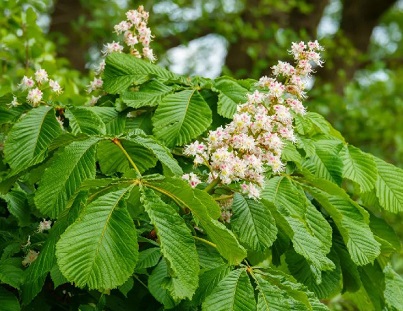Herbs And Phytochemicals: Beta-Escin From Aesculus Hippocastanum Is A Broad-Spectrum Antiviral Against Coronaviruses Including SARS-CoV-2
Nikhil Prasad Fact checked by:Thailand Medical News Team Mar 19, 2024 1 year, 6 months, 4 weeks, 1 day, 20 minutes ago
Herbs And Phytochemicals: The ongoing battle against respiratory viruses, particularly in light of the COVID-19 pandemic caused by SARS-CoV-2, underscores the urgent need for effective antiviral therapies. Traditional approaches often focus on direct antiviral agents, which can lead to the development of drug resistance over time. In contrast, modulating the host immune response has emerged as a promising strategy to combat viral infections while reducing the risk of resistance.
 Aesculus-Hippocastanum (Horse Chestnut)
Aesculus-Hippocastanum (Horse Chestnut)
Aesculus hippocastanum L., commonly known as horse chestnut, has attracted attention due to its rich bioactive compound called beta-escin. This
Herbs And Phytochemicals news report delves into the multifaceted antiviral potential of beta-escin from Aesculus hippocastanum, particularly its efficacy against coronaviruses like SARS-CoV-2.
Understanding the Threat: Respiratory Viruses and the Need for Broad-Spectrum Therapies
Respiratory viruses pose significant threats to public health, causing a range of illnesses from mild infections to severe respiratory distress syndromes. The traditional approach to managing such viruses involves supportive care and targeted antiviral therapies. However, the emergence of drug-resistant strains highlights the limitations of this approach.
The COVID-19 pandemic serves as a stark reminder of the importance of developing broad-spectrum antiviral therapies. Such treatments would not only address current viral threats but also prepare us for future pandemics. Beta-escin from Aesculus hippocastanum emerges as a potential candidate due to its diverse pharmacological properties.
Exploring Beta-Escin and Aesculus Hippocastanum: Anti-Inflammatory Effects and Mechanisms of Action
Beta-escin, a bioactive compound found in Aesculus hippocastanum, is renowned for its anti-inflammatory effects. Studies have shown that beta-escin modulates the NF-κB signaling pathway, a crucial regulator of inflammation and immune responses. This mechanism of action makes beta-escin an attractive candidate for combating viral infections that trigger excessive inflammation.
Furthermore, research has highlighted the virucidal and broad-spectrum antiviral properties of beta-escin against various enveloped viruses. These findings suggest that beta-escin could be a valuable asset in the fight against coronaviruses, including SARS-CoV-2.
Antiviral Activity Against Coronaviruses: Experimental Evidence and Mechanistic Insights
Recent studies have provided compelling evidence of beta-escin and Aesculus hippocastanum's antiviral activity against coronaviruses. Experimental assays demonstrated a concentration-dependent reduction in viral titers of coronaviruses such as SARS-CoV-2 and CCoV. Importantly, these effects were achieved without compromising cell viability, highlighting the specificity of beta-escin's antiviral action.
Further investigatio
ns into the mechanisms of action revealed that beta-escin and Aesculus hippocastanum interfere with early stages of the viral life cycle, particularly viral internalization. Time-of-addition assays elucidated the optimal timing for administering beta-escin to inhibit viral replication effectively. Additionally, these compounds exhibited prophylactic protection against coronavirus infections, underscoring their potential in preventing viral spread.
Modulating Host Immune Response: NF-κB Signaling and Cytokine Regulation
Apart from their direct antiviral effects, beta-escin and Aesculus hippocastanum play a pivotal role in modulating the host immune response. By targeting the NF-κB signaling pathway, these compounds inhibit viral replication and reduce the production of pro-inflammatory cytokines such as IL-6 and TNF-α. This dual action not only combats viral infections but also mitigates the inflammatory cascade associated with severe respiratory illnesses.
Clinical Implications and Future Directions
The comprehensive analysis of beta-escin from Aesculus hippocastanum reveals its immense potential as a broad-spectrum antiviral agent against coronaviruses, including the notorious SARS-CoV-2. The synergistic effects of beta-escin's antiviral activity, immunomodulation, and virucidal properties pave the way for novel therapeutic interventions in respiratory virus management.
Future research should focus on refining dosage regimens, assessing safety profiles in clinical settings, and exploring synergistic combinations with existing antiviral therapies. Collaborative efforts between researchers, clinicians, and pharmaceutical industries are essential to translating these findings into practical solutions for combating viral pandemics effectively.
Conclusion
Beta-escin from Aesculus hippocastanum holds tremendous promise as a versatile weapon against respiratory viruses, especially coronaviruses like SARS-CoV-2. Its ability to modulate the host immune response, inhibit viral replication, and directly target viral particles underscores its potential as a broad-spectrum antiviral agent. Continued research and development efforts are imperative to harnessing the full therapeutic potential of beta-escin in clinical practice, thereby addressing critical gaps in antiviral therapy and pandemic preparedness.
The study findings by the researchers from Universidad de Buenos Aires-Argentina were published in the peer reviewed journal: Scientific Reports (Nature).
https://www.nature.com/articles/s41598-024-56759-y
For the latest on
Herbs And Phytochemicals, keep on logging to Thailand Medical News.
